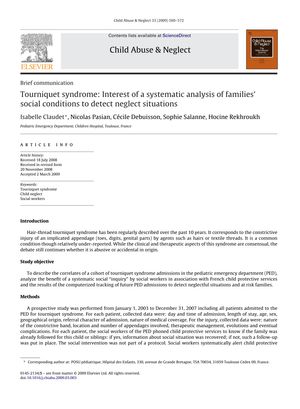TLDR Checking family social conditions in tourniquet syndrome cases can help find neglect.
Between 2003 and 2007, a study at the Pediatric Emergency Department in Toulouse, France, observed 41 children with tourniquet syndrome (TS), where appendages are constricted by hairs or threads. The children had a mean age of 5.5 months, with 68% under 5 months old, and 93% of cases involved toes. The study found that 95% of the constrictive agents were hairs and incidents mostly occurred on Sundays. Social inquiries indicated that 51% of the families had incomplete medical social coverage, and 43% were known to child protective services. A follow-up on children admitted from 2003 to 2006 showed that one-third had domestic accidents within 13 months post-admission. The study recommended systematic social worker intervention in TS cases to detect potential neglect.
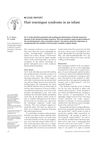 14 citations
,
February 2007 in “The Journal of Bone and Joint Surgery”
14 citations
,
February 2007 in “The Journal of Bone and Joint Surgery” A baby's toe was saved from serious damage by quickly removing a hair wrapped tightly around it.
 43 citations
,
September 2006 in “Annals of Plastic Surgery”
43 citations
,
September 2006 in “Annals of Plastic Surgery” A hair wrapped tightly around an infant's toe caused severe damage, requiring early removal and possibly surgery to prevent worse outcomes like amputation.
22 citations
,
July 2006 in “Annals of The Royal College of Surgeons of England” Hair or fiber wrapped tightly around a toe can lead to serious injury if not treated quickly.
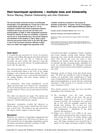 21 citations
,
July 2005 in “European Journal of Emergency Medicine”
21 citations
,
July 2005 in “European Journal of Emergency Medicine” Hair-tourniquet syndrome can cause serious toe injuries in infants but can be treated if found early.
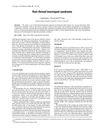 37 citations
,
March 2005 in “Journal of Paediatrics and Child Health”
37 citations
,
March 2005 in “Journal of Paediatrics and Child Health” A hair strand caused a rare case of limb strangulation in a teenage girl with autism, and the condition is not always linked to child abuse.
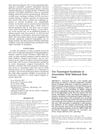 45 citations
,
March 2003 in “Pediatrics”
45 citations
,
March 2003 in “Pediatrics” Baby's toe injury linked to mom's hair loss; check baby's toes and be careful with fruit gel snacks.
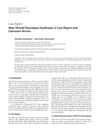 28 citations
,
January 2012 in “Case Reports in Medicine”
28 citations
,
January 2012 in “Case Reports in Medicine” Hair-thread Tourniquet Syndrome, where hair or thread tightly wraps around a body part, is not rare and requires early detection to prevent serious damage.
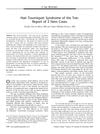 17 citations
,
December 2009 in “Journal of Pediatric Orthopaedics”
17 citations
,
December 2009 in “Journal of Pediatric Orthopaedics” Two babies needed surgery to remove hair tightly wrapped around their toes to prevent serious injury.
 43 citations
,
September 2006 in “Annals of Plastic Surgery”
43 citations
,
September 2006 in “Annals of Plastic Surgery” A hair wrapped tightly around an infant's toe caused severe damage, requiring early removal and possibly surgery to prevent worse outcomes like amputation.
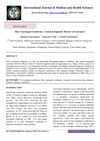 November 2013 in “International Journal of Medical and Health Sciences”
November 2013 in “International Journal of Medical and Health Sciences” Doctors often miss Hair Tourniquet Syndrome, which can lead to serious damage if not treated quickly.
 August 2022 in “Archives of pediatric surgery”
August 2022 in “Archives of pediatric surgery” Hair-Thread Tourniquet Syndrome is a rare condition where hair or thread tightly wraps around a child's body part, requiring quick treatment to prevent damage.
